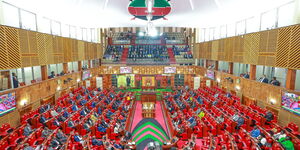Cooperatives Cabinet Secretary Wycliffe Oparanya has directed all SACCOs with fewer members to merge with larger ones in a move aimed at enhancing financial stability and sustainability in the sector.
Speaking on Thursday during the official launch of the Sacco Supervision Report 2024, Oparanya pointed out that a larger number of Back Office Services Activity (BOSA)-only SACCOs remain inactive or merely exist on paper.
He observed that the few active BOSA-only SACCOs are struggling, with limited membership numbers making them financially unstable and unsustainable in the long term, and therefore making it hard to even regulate them.
''We must come to the reality that there are so many BOSA-only SACCOs spread across the country, but which are inactive and only exist on paper. The few active ones are neither stable nor financially viable because they serve just a few members,'' the CS stated.
According to Oparanya, the time has come for the SACCO sector to embrace market-driven solutions such as mergers and consolidations.
He maintained that this will be the only way to help them secure their financial future and improve governance.
''The time has come for the SACCO sector to explore market-driven solutions of consolidation and mergers of these very small BOSA-only SACCOs. This is the only way to ensure their financial viability and sustainability. I direct the officials of such cooperatives to immediately start conversations relating to mergers,'' he directed.
Ministry Guidelines
To aid the process, the CS announced that the Ministry will issue guidelines to support the amalgamation of smaller SACCOs with larger, more stable entities.
Oparanya on SACCO Governance
The CS further directed that SACCOs with over 5,000 members adopt the delegate system to ensure that their general meetings are effective platforms for decision-making.
Also, SACCOs will not be allowed to borrow from external sources to pay dividends. To guide the process, Oparanya said that any SACCO seeking external loans must first obtain written approval from the Commissioner, subject to regulatory compliance.
The CS also called for a review of the current SACCO registration threshold, which is currently at ten members, questioning its sustainability in the current financial environment.
Matatu SACCOs
As part of the review of the governance structure, the CS pointed out that some transport cooperatives were not true SACCOs, urging a further streamlining of their structure and operations.
''On the same note, I do know that there are several Transport Cooperatives, which are currently registered or operating as Matatu or PSV SACCOs. These entities are not SACCOs because they are not engaged in the mobilisation of deposits and/or intermediating the deposits as credit. They are simply an association of people coming together to operate a transport business or manage routes as required by the National Transport Safety Authority (NTSA),'' he said.
Meanwhile, the Sacco Societies Regulatory Authority (SASRA) and the Commissioner of Cooperatives have been directed to tighten oversight on audited accounts, with financial statements to be countersigned by CEOs, finance officers, and board members.












